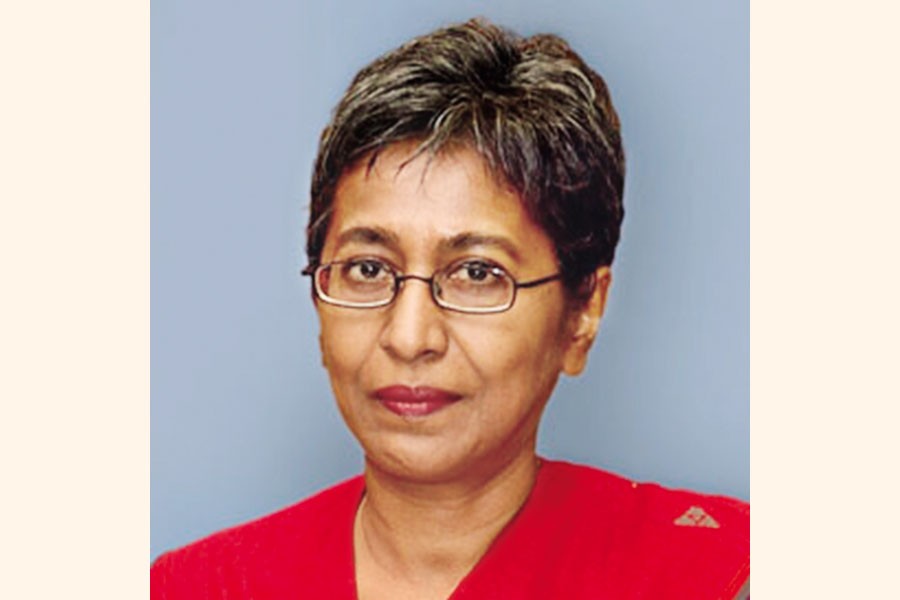Sri Lanka’s full economic recovery will take time
Dr Dushni Neelika Weerakoon tells FE

Published :
Updated :

After a year of the worst economic crisis in history, Sri Lanka's economy is struggling hard to recover from its deep wounds. Though there are some signs of recovery, it will take more time for obvious reasons.
A leading economist of the island nation made these observations in Dhaka last week while talking to the Financial Express (FE).
"Sri Lankan economy is not yet fully recovered, but it has regained some degree of macroeconomic stability," said Dr Dushni Neelika Weerakoon. "Inflation has come down and the exchange rate has also stabilised to some extent."
Dr Dushni, the executive director of the Institute of Policy Studies of Sri Lanka (IPS), a leading think-tank in the country, added that during the crisis, the inflation rate reached over 70 per cent and the local currency depreciated by 80 per cent against the US dollar, severely destabilising the macroeconomic stability in the last year.
The economic downturn resulted in a contraction of Sri Lanka's gross domestic product (GDP) by around 8.0 per cent in the last year. Official foreign exchange reserves dropped from US$7.6 billion in 2019 to less than US$400 million in June 2022.
"To curb inflation, interest rates were jacked up and taxes were also increased to cut the fiscal deficit," she continued. "All these are very bitter measures. And even so, the economy has not yet returned to a growth path. It is projected that GDP would be contracted by around 3.0 per cent in the current year."
The island's headline inflation, as measured by the year-on-year change in the Colombo Consumer Price Index (CCPI), came down to 1.50 per cent in October this year from 66.0 per cent in October 2022.
According to the country's Census and Statistics Department, Sri Lanka's economy shrank 3.10 per cent in the second quarter of the current year. The agriculture sector grew by 3.60 per cent from a year earlier, but industrial output contracted by 11.5 per cent and services activities declined by 0.8 per cent. Earlier in the first quarter, the overall economy contracted by 11.5 per cent.
"Recovery is not easy as it is a long process and requires painful measures," she further added. "By cutting back government spending, there is now little resource for expenditure. Moreover, there will be a presidential election next year. So, it may be difficult to continue the bitter measures, especially in the run-up to the election."
To contain the sharp fall of the economy, the South Asian nation sought assistance from the International Monetary Fund (IMF) last year. After hectic and extensive negotiations, the IMF agreed to provide a US$2.9 billion bailout package for the country in March this year, with a set of conditions including a series of economic reform programmes.
Dr Dushni, who was in Dhaka last week to attend the Fourteenth South Asia Economic Summit (SAES XIV), also mentioned the slow progress in regional economic cooperation.
She said that there are barriers to fully implementing the South Asian Free Trade Area (SAFTA) agreement, which came into effect in 2006. Under the agreement, eight member countries of the South Asian Association for Regional Cooperation (SAARC) are committed to implementing the deal phase-by-phase.
Dushni added that there is almost no progress regarding the SAARC Agreement on Trade in Services (SATIS) that was signed 13 years ago.
"Meantime, a lot of changes have taken place in the region in the last decade, where trade and investment no longer seem to be priorities," she continued, adding the bilateral trade cooperation is gaining momentum. "For instance, Bangladesh and India have extended economic cooperation," she added.
Regarding the continuation of trade benefits for the graduating least developed countries (LDCs), the economist said that it would ultimately depend on the strategies of bilateral partners.
Last month, the General Council of the World Trade Organization (WTO) Agreement decided to extend the international support measures for graduating countries to assist LDCs in their transition out of the least developed club.
In South Asia, three countries are now on the path to graduation. Bhutan will be graduated from the list by the end of this year, while Bangladesh and Nepal by 2026.
"Once you lose concessions and preferential treatment, you need to go through tough competition in the global market," Dushni said.
asjadulk@gmail.com


 For all latest news, follow The Financial Express Google News channel.
For all latest news, follow The Financial Express Google News channel.